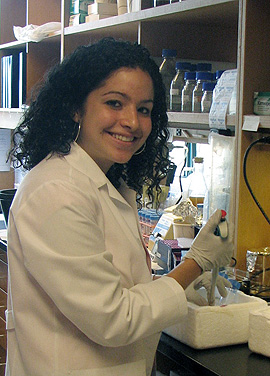Senior Studies Rare Type of Cancer Syndrome as Fellow
| Posted 09/06/07 |
 Adriana Cohen Rostoker 08 always had a curiosity about how the body works. This summer, she had the opportunity to get a closer look as she worked with physicians and researchers on a rare type of cancer syndrome. Adriana Cohen Rostoker 08 always had a curiosity about how the body works. This summer, she had the opportunity to get a closer look as she worked with physicians and researchers on a rare type of cancer syndrome.
As a 2007 Alvan T. and Viola D. Fuller American Cancer Society Junior Research Fellow, Cohen Rostoker was awarded a $4,000 grant from the American Cancer Societys New England Division to complete a 10-week fellowship. She applied for the fellowship last year, seeking an opportunity to learn more about the molecular basis and function of cells. I have always been fascinated by the nature of cancer and the ability of cancerous cells to defy the laws of replication, and thus proliferate aberrantly and indefinitely, she says. The Fuller Fellowship sounded like an amazing opportunity to do cancer-related research in a lab setting. Cohen Rostoker’s research focused on a familial cancer syndrome characterized by the formation of multiple tumors within the nervous system, called Neurofibromatosis type II. This syndrome is caused from a dominant genetic disorder at birth. She specifically examined a protein found in cells called Merlin, which functions normally as a tumor suppressor. Neurofibromatosis type II occurs in approximately 1 of 25,000 births and is caused when Merlin is mutated. I hope that my research will one day help determine Merlins role in Neurofibromatosis type II so that better treatments can be found for the disease, she says. The Newton, Mass. resident worked under the guidance of Andrea McClatchey, Ph.D. and Marcello Curto, MD, Ph.D. at the Center for Cancer Research, an affiliate for Massachusetts General Hospital. I was lucky to have such wonderful mentors to teach and challenge me, and I could not have done so much of the research on my own without their guidance and patience, she says. This year marks the 40th anniversary of the Fuller-American Cancer Society Fellowships, which offer grants to gifted young undergraduate students, introducing them to basic cancer research. The Fellowship began in 1967, when the family of Alvan T. and Viola Fuller made a major gift to the American Cancer Society to advance cancer research. Cohen Rostoker, who is double majoring in neuroscience and behavior and biology and biochemistry, says several Wesleyan laboratory-based classes prepared her for the fellowship, including advanced molecular biology and genetics, organic chemistry and cellular anatomy and physiology. These classes provided me with a solid base, and they were essential for my summer fellowship, she says. Cohen Rostokers future plans are to volunteer abroad with a non-governmental organization in an area of public health, and then continue her education in medical school. She would like to become a pediatric oncologist one day. Even though I enjoy doing research, I have a passion to work directly with patients, she says. |
| By Olivia Drake, Wesleyan Connection editor |

